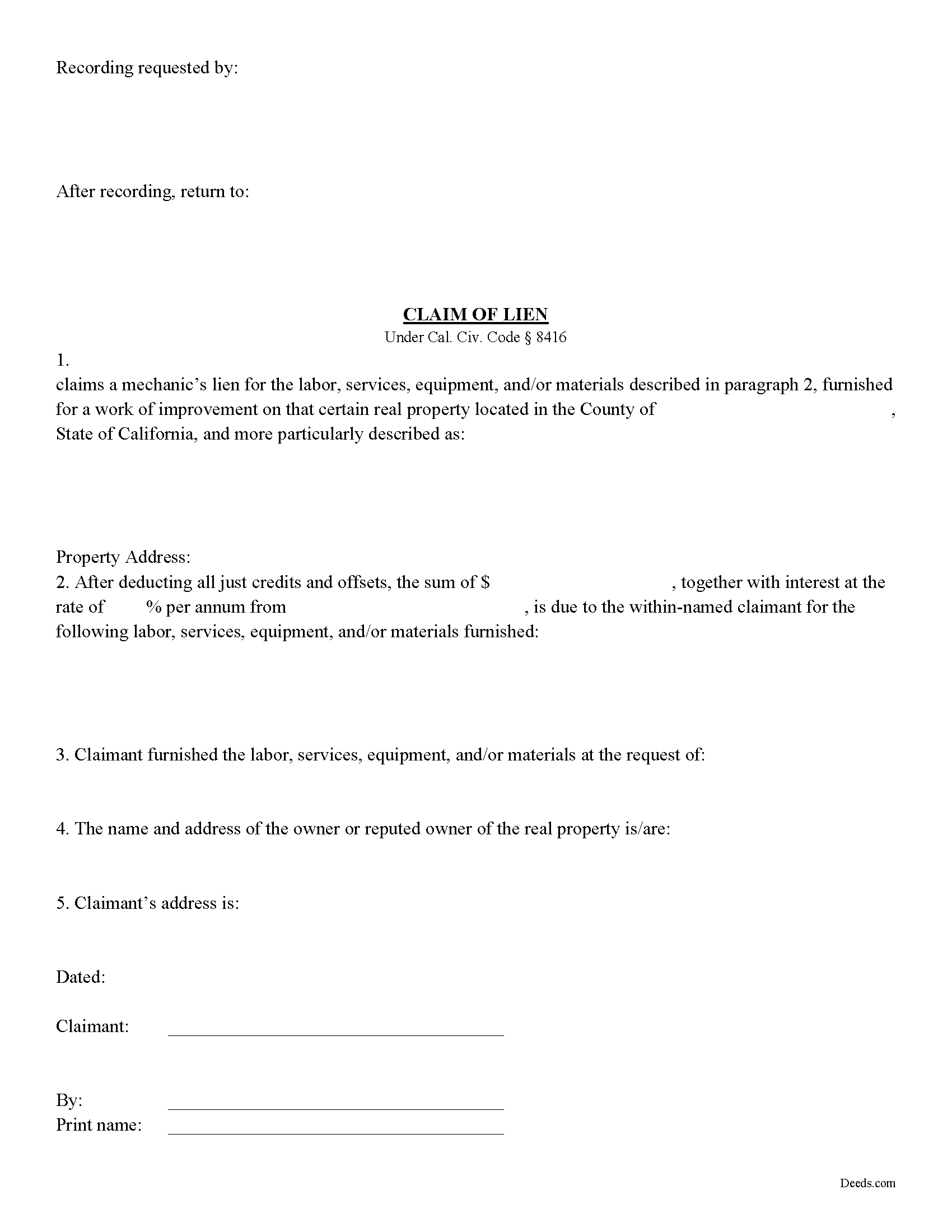Download California Notice of Mechanics Lien Legal Forms

California Notice of Mechanics Lien Overview

Mechanic's liens are an available remedy in the state of California for unpaid direct contractors, subcontractors, material suppliers, equipment lessors, laborers, design professionals, and any person providing work authorized for a site improvement (Civ. Code 8400).
To file a mechanic's lien in California, a claimant must have served preliminary notice to the property owner in accordance with Civ. Code 8410. In general, all work must have ceased before filing a claim of lien.
A direct contractor cannot enforce a lien unless a claim of lien is filed within 90 days after completion of work, or within 60 days after the owner records a notice of completion (Civ. Code 8412). A claimant other than a direct contractor may not enforce a lien unless the claimant records a claim of lien after it has ceased to provide work, or before the earlier of the following times: Ninety days after completion of the work of improvement, or thirty days after the owner records a notice of completion or cessation (Civ. Code 8414).
The law requires strict compliance with the statute in drafting and serving a mechanic's lien since it is an impediment on the owner's title that can affect his or her property rights. Once filed, a mechanic's lien can interfere with the owner's ability to sell the property or obtain financing.
The claim of mechanic's lien must be filed as a written statement, signed and verified by the claimant, containing a statement of the claimant's demand after all just credits and offsets; the name of the owner or reputed owner; a general description of the work furnished by the claimant; the name of the person by whom the claimant was employed or to whom the claimant furnished work; a description of the site sufficient for identification; and the claimant's address (Civ. Code 8416).
In addition to the claim of lien, a statutory statement of notice of mechanic's lien must be included in the document (Civ. 8416(a)(8)). As evidence that the claim of mechanic's lien has been properly served on the owner, the person serving a copy of it must also complete and sign a proof of service affidavit (Civ. 8416(c)(1)). California law also allows that if the owner cannot be served a manner provided by Civ. Code 8416(c)(1), the notice may be served on the direct contractor or construction lender (Civ. 8416(c)(2)).
As a claimant, be careful about the amount claimed in a mechanic's lien. Exercise good faith in the claimed amount without any exaggeration or inflation. Any mistakes or attempts to "fluff up" the amount can be detrimental to any lien right. You might even be liable for damages to the property owner in a lawsuit for a false claim of mechanic's lien. The amount cannot include any attorney's fees, lost profits, or delay damages. These may be recoverable, however, if your lien later transforms into a legal action. You are entitled to claim interest though, which is measured from the date on which the amount became due.
Once a lien is in place, a claimant has an enormous bargaining chip to induce payment by the property owner. However, obtaining a lien alone will not always guarantee payment. In California, a mechanic's lien is only effective for ninety days and will expire thereafter (Civ. Code 8460). Therefore, you must file an action in court to enforce the lien. For those wary of going to court, less adversarial options such as arbitration may be available.
Even if you correctly record you mechanic's lien by following all the required steps and ensuring the accuracy of all your filings, be aware that others may have preexisting claims. Creditors' claims are governed by the golden rule of priority of "first in time, first in right." Recall the old proverb, "The early bird gets the worm," because the same situation applies here. If a senior lien claimant seeks to enforce his or her claim first, your lien becomes junior to that claim. Therefore, when property is ordered sold to pay out a judgment and the senior claimant is paid, the amount remaining after sale might not be enough to satisfy what you were originally owed.
Additionally, it may even be split on a pro rata basis between you and other claimants. You're not completely out of luck, but it will be more difficult to collect the remainder. Your remedy will be through a deficiency judgment against the property owner for any amount that the sale of the property won't cover. Furthermore, even if you properly record before others, some types of property interests will have a "super priority" over yours, such as a construction mortgage due to the policy interest in encouraging lenders to finance construction projects. In summary, although priority cannot always be guaranteed, you should be diligent to mark important dates on your calendar for sending preliminary notice and filing the claim of lien.
Finally, remember that mechanic's lien laws are complicated, and mistakes or oversights can be fatal to your lien rights. Please contact an attorney with questions about mechanic's liens, or for any other issues regarding real property in California.